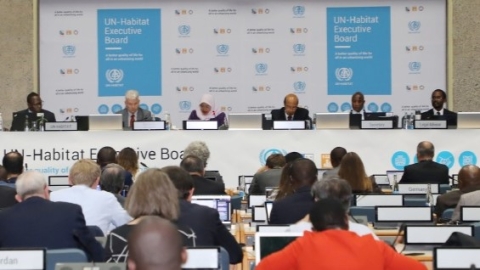
The global population living in urban areas is expected to double by 2050. Proper development of cities will need to account for health, environmental, and climate impacts.
The following article was published in the July-August 2023 issue of NewsNotes.
Cities are the refuge for 60% of the people fleeing natural disasters and civil conflict, with a projected number of three billion living in inadequate housing by 2030. UN Habitat states: “Populations, economic activities, social and cultural interactions, as well as environmental and humanitarian impacts, are increasingly concentrated in cities, and these pose massive sustainability challenges in terms of housing, infrastructure, basic services, food security, health, education, decent jobs, safety and natural resources, in addition to other factors.”
Already cities and urban territories are major culprits in climate change. They emit 70% of greenhouse gas emissions. City particulate pollution is heavy, especially in the poor, socially marginalized districts constituting not only an environmental problem but also a social justice issue.
The World Health Organization states that: “For the approximately one billion people living in urban slums and informal settlements a combination of crowding, pollution, noise, inadequate lighting, lack of green spaces and other environmental factors exacerbate mental health disorders, including depression, anxiety, violence and other forms of social dysfunction.”
Against this backdrop, the second session of the UN Habitat Assembly (UNHA) convened in Nairobi, Kenya, from June 5-9 and adopted ten resolutions to set on course urban transformations needed to meet environmental challenges of the new century.
Resolutions adopted by the UNHA include:
- Formulation of international guidelines on people-centered smart cities, by an inclusive involvement in digital literacy, which can also create economic opportunities through innovation and equitable activities;
- Acceleration of the transformation of informal settlements and slums by 2030; (UN-Habitat recommends ten key actions, among which are participatory governance, spatial planning, diversified financing, adequate housing, recognizing the social function of public and private land, and advancing skills and education.)
- Designation of September 20 as World Cleanup Day, beginning in 2024;
- Creation of biodiverse and resilient cities by mainstreaming biodiversity in urban and territorial planning;
- Enhancement of the interlinkage between urbanization and climate change resilience by operationalizing the Sustainable Urban Resilience for the next Generation (SURGe) launched at COP 27 in Egypt;
- Advancement of the goal of adequate housing for all, for which UNHA will establish an expert working group to accelerate progress towards the universal achievement of safe, sustainable, adequate and affordable housing;
- Development of a global digital platform for holistic urban planning and sustainable infrastructure;
- The creation of a Risk Reduction and Crisis Response framework; and
- Equitable financing and effective monitoring.
The United Nations addressed urban problems in prior conferences, in 1976 and 1996, resulting in the UN creation of the Centre for Human Settlements, which in 2001 was replaced by the UN General Assembly with the UN Human Settlements Program (UN-Habitat.)
Number 11 of the UN’s Sustainable Development Goals, approved in 2015, aimed to “make cities and human settlements inclusive, safe, resilient and sustainable” by 2030. Targets of this goal included affordable housing for all, provision of basic services, expansion of public transport with special attention to people with disabilities, more robust urban planning and management, reduction of adverse environmental impacts (particularly poor air quality and waste management,) and universal access to green spaces.
Given the elevated priority, UN-Habitat was further strengthened in 2018 by establishment of the UN Habitat Assembly as an independent UN entity, based in Nairobi. The latest Urban Agenda reported in this article was the product of the second-ever session of that assembly.
Despite all the focus on housing and urban development over the past decades, a stark report by the UN General Assembly in 2022 reveals that member states are far behind in meeting the goals of SDG 11.
The latest UNHA conference criticized prior urban agendas for being primarily aspirational, without clear strategies and measurable milestones to guide implementation. Other challenges of previous iterations included lack of funding and organizational capacity.
Noting these challenges, UNHA committed itself to an ambitious plan of action, including strengthening the role of UN-Habitat as the UN’s focal point for sustainable urbanization and the advancement of multilateral engagement and international cooperation on a range of urban and housing issues.
Photo of the UN Habitat second assembly via unhabitat.org
